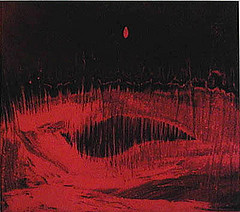Under the Skin is a film based on the Michel Faber’s novel and talks about an alien who takes the body of an attractive woman, Scarlett Johansson, and drives a van around the streets of Glasgow killing random men. Johansson dresses in a way as an ordinary girl, who wants to be liked (by men), needs to look like; she wears red lipstick and a black bob wig and buys (the right) clothes that empathised her voluptuous figure: skinny jeans, a low-necked red jumper, a synthetic fur, and a pair of heeled boots. She behaves as a woman who is aware of her sexual appeal and enjoys –quoting the Au Pairs’ album- ‘playing with a different sex’; we can see that by the way she easily manages to stop men on the street with the excuse of asking for directions and offering a lift, and to attract them to her place. Would you ever accept a lift from Scarlett Johansson? Oh yeah, most of the men (and women as well) would do probably, even without being aware that the lady chit chatting them from a van is Scarlett Johansson –like some of the Glaswegians in the film. When in front of the sensual woman who walks sensually and gets undressed –the high levels of tension and sensuality of the scene are increased by a superb score by Mica Levi, all men lose their minds (get so horny) to the point that they are unable to realise what is happening in reality: they are not going to have sex with Scarlett Johansson but in fact they are sinking into an oily dark floor. So all men who think of the alien in sexual terms seem being destined to a punishment: suffocating inside a dark mysterious space, which made me think so much of that series of beautiful etching by Anish Kapoor called ‘Blackness from her womb’. Is that dark space symbol of woman’s genital then? Possibly! Under the Skin seems condemning male lust and representing female sexuality as dangerous social weapon.

If Scarlet Johansson’s trick may provoke (a kind of perverse?) enjoyment at first - my eyes felt a kind of anxious curiosity when following the alien’s gaze across the streets of Glasgow: who is going to be her next victim?- it can also result disturbing when Johansson lets a screaming innocent toddler dying in the most inhumane way. We would have expected a ‘real’ woman to (at least) show a maternal tenderness when in front of a crying toddler; but in fact the sexy woman is not human. However, this is proved wrong when during one of her nocturnal hunting Johansson happens to run into a man affected by neurofibromatosis, who recalls a Lynchian ‘Elephant Man’. The deformed man is allowed to food shopping only at night since society doesn’t accept him as a human being, like in the Lynch’s film. Who is now the alien then? We are here put in front of a dramatic and crucial point in which on one side we almost struggle to keep watching the screen when the camera closes up on the deformed man, but on the other side -for the first time perhaps- we actually sympathise for a Johansson’s victim. The degree of humanity accorded to both Johansson and the deformed man relies only on what we (us as society) accept as ‘normal’. When the beautiful alien happens to be in front of somebody who can be considered less human than her, she shows a human side by sparing her victim’s life this time.
The last part of the film features a woman who almost naively discovers herself, gets lost –in a gorgeous wild Scotland- and is extraneous of those rules that govern society. Whether before Johansson appeared in perfect control of her sexuality, she is now unable to have any human love relationship. She was thought and created as a men’s sexual fantasy and therefore she struggles to see herself as a ‘real’ woman; the scene of her attempt to have sex with (the only) a man who shows affection to her, is emblematic of this. Is Glazer here trying to make the point that a beautiful woman can find social approval easily when seen as a sexual object then? Yes, probably! The whole film seems being a reflection on female sexuality in relation to what society expects from it. Indeed, what is socially accepted and socially unaccepted, Under the Skin tells us very loudly and the last scene of the film summarises that very well, I think. Scarlett Johansson is walking alone in the wood, something that every girl since was little has been warned to do as “dangerous”, -although in reality it is not, but the society makes us perceive as so-, and in this way is breaking the social rules; as a consequence Johansson is going to be raped. The scene is disturbing and full of tension; we all expect someone (a man perhaps) to come and save her. No one will save her, like in real life (or in a beautiful fairy tale), but what in fact rescues her from being raped is her not-human nature. She is still an alien or just an object of someone’s fantasy.
